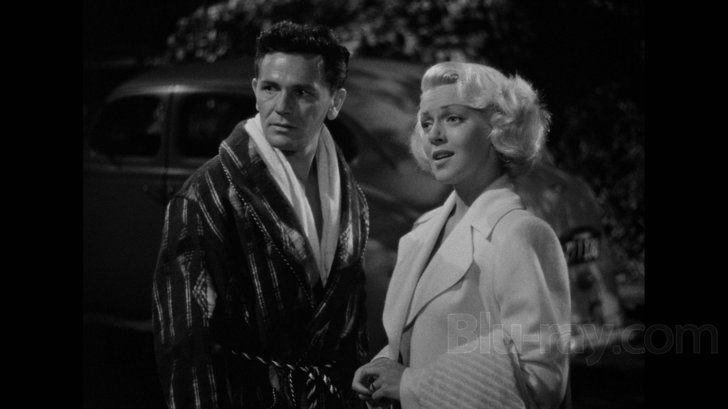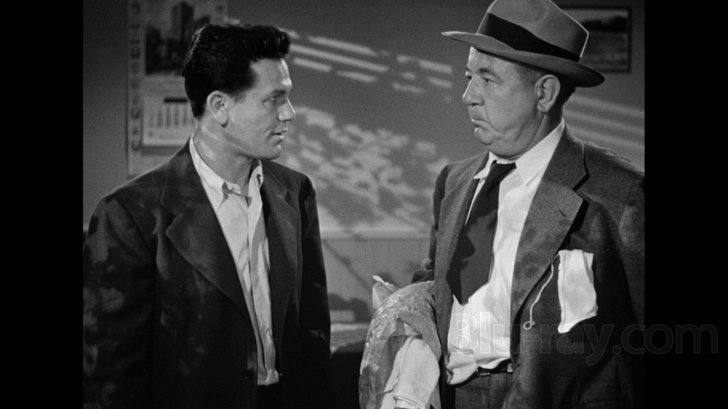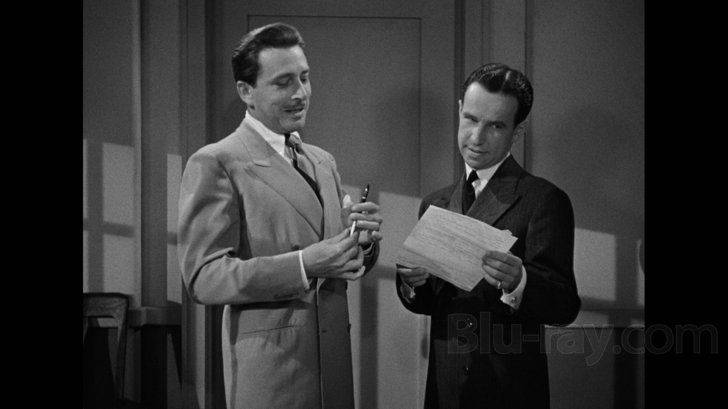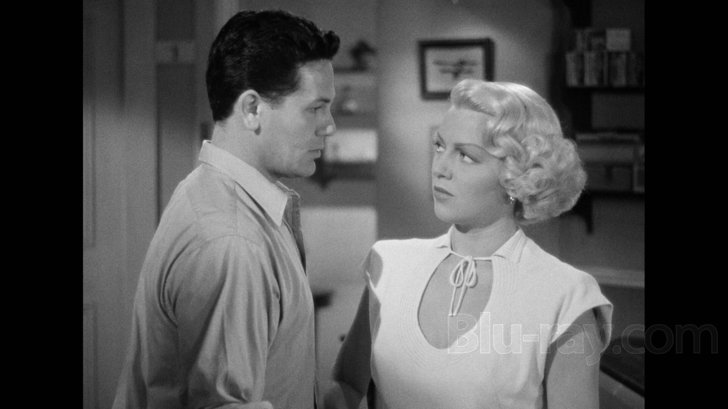The Postman Always Rings Twice Blu-ray Movie
HomeThe Postman Always Rings Twice Blu-ray Movie 
Warner Bros. | 1946 | 113 min | Not rated | Nov 13, 2012
Movie rating
7.5 | / 10 |
Blu-ray rating
| Users | 4.0 | |
| Reviewer | 4.0 | |
| Overall | 4.0 |
Overview
The Postman Always Rings Twice (1946)
A married woman and a drifter fall in love, then plot to murder her husband... but they must live with the consequences of their actions.
Starring: Lana Turner, John Garfield, Cecil Kellaway, Hume Cronyn, Leon AmesDirector: Tay Garnett
| Film-Noir | Uncertain |
| Romance | Uncertain |
| Drama | Uncertain |
| Crime | Uncertain |
Specifications
Video
Video codec: MPEG-4 AVC
Video resolution: 1080p
Aspect ratio: 1.37:1
Original aspect ratio: 1.37:1
Audio
English: DTS-HD Master Audio Mono (48kHz, 24-bit)
French: Dolby Digital Mono
Spanish: Dolby Digital Mono
Portuguese: Dolby Digital Mono
German: Dolby Digital Mono
Italian: Dolby Digital Mono
Spanish = Latin & Castillian
Subtitles
English SDH, French, German SDH, Italian SDH, Japanese, Portuguese, Spanish
Discs
50GB Blu-ray Disc
Single disc (1 BD)
Playback
Region free
Review
Rating summary
| Movie | 4.5 | |
| Video | 3.5 | |
| Audio | 3.0 | |
| Extras | 4.0 | |
| Overall | 4.0 |
The Postman Always Rings Twice Blu-ray Movie Review
Postage Due: Your Life
Reviewed by Michael Reuben November 28, 2012The 1946 film noir classic, The Postman Always Rings Twice, was the third film adaptation of James M. Cain's 1934 novel but the first one to use Cain's original title. The previous two had the excuse that they were in French (Le dernier tournant) and Italian (Ossessione). Even so, Cain's title mystified readers, because there's no reference to a postman in the novel. The screenplay filled that omission with dialogue near the end, based on an explanation provided by Cain in the preface to Double Indemnity, which the author published in 1943 and Billy Wilder and Raymond Chandler adapted for the screen the following year. I won't repeat the explanation here, because it's twisty and spoiler-laden; I'm just reassuring first-time viewers that their patience will be rewarded. (The 1981 remake omits this part of the story.) The production code of the era prevented femme fatale Lana Turner and hard-boiled sap John Garfield from exchanging more than a kiss, but audiences had no doubt about what they were doing off camera. From the moment the adulterous couple surveyed each other, it was obvious they were headed for the bedroom—and might not even make it that far before they became entangled. Garfield was already a major star for Warner Brothers (and would be better known today, if the black list and death from a heart attack at age 39 had not cut his career short), but Turner was still primarily a pretty face. Postman was the film that gave her credibility as a dramatic actress, because the role of Cora Smith required a performance that kept everyone guessing right to the end credits and beyond. Other characters were never sure what to make of Cora, and neither was the audience. Even now, when many elements of the film have dated after sixty-two years, it's impossible not to have your gaze drawn to Turner's Cora and wonder what lurks behind those eyes.

At one level, the plot of Postman is simplicity itself. A drifter, Frank Chambers (Garfield), takes a temporary job working at a California roadside restaurant and gas station owned by an older man, Nick Smith (Cecil Kellaway), married to a pretty young wife, Cora (Turner). Frank and Cora begin an affair, Nick is in their way, and before long they start talking about removing him. Murderous planning ensues. It seems straightforward enough but then there's that title, with its reference to duplication and repetition. Cain's novel and the screen adaptation by Harry Ruskin and Niven Busch are full of false starts, unexpected detours, subplots and tangents that keep diverting the illicit lovers away from their goal, only to steer them more inexorably to their doom. The film's first double entendre is the sign that confronts Frank when he's dropped off at the Smith restrautant by the kindly motorist with whom he's hitched a ride: "Man Wanted". Depending on the point of view (Nick's, Cora's or the law's), the sign has at least three meanings. The film's second "doubling" joke comes when we discover the identity of the benefactor who has generously driven Frank to his fateful destination. He's Sackett (Leon Ames), who just happens to be the local D.A., and he's Postman's Inspector Javert, though more cheerful than the infamous investigator from Les Misérables. Once having seen Frank, Sackett locks on his target. The law is on the scene even before temptation enters in the person of Cora, preceded by a lipstick, cooly appraising Frank from behind her sunglasses. It's a mark of the film's complex approach to character that Nick Smith, who at first seems a foolish, good-hearted soul entangled by female wiles, ultimately reveals a different side: a cold, cruel man who believes that wives are meant to serve and suffer in silence, no matter how arbitrary their husbands' decisions. (He obviously doesn't know his wife well enough to realize how dangerous to his health that attitude can be.) As for Cora and Frank, their twists and turns ultimately land them in criminal court, albeit in such a backward fashion that their plight intrigues a local defense hotshot who is Sackett's nemesis, Arthur Keats (so named, no doubt, because he manipulates the law like a poet playing with language). The late Hume Cronyn plays Keats in a wily performance that almost steals the picture from the two leads. Rarely has the screen provided such a detailed portrait of legal amorality, as Keats relishes every opportunity to finagle the system into exonerating the wicked. Frank narrates the film in the rueful, "sadder but wiser" tone that seemed to come naturally to Cain's tragic heroes. Like Ned Racine in Body Heat (1981), which drew much of its inspiration from Postman, Frank realizes at some point that he's been had, but he's helpless to resist the woman for whom he'd gladly give everything. As for Cora, does anyone ever really know her? Frank still wonders at the end of the film, and so will you.
The Postman Always Rings Twice Blu-ray Movie, Video Quality 

The Postman Always Rings Twice was one of the last films shot by Sidney Wagner (Boys Town) before his untimely death at the age of 47. The film is unusual among classics of film noir for being largely shot in brightly lit settings, with relatively few scenes at night. Only a few settings occur in a city environment. Still, Wagner's effective black-and-white photography and the efficient staging by director Tay Garnett maintain the familiar film noir sense of suspense and unease even in wide open spaces. (A late-night scene involving a cat and a ladder is particularly well done.) Warner's 1080p, AVC-encoded Blu-ray isn't the eye-popping revelation of some of the other B&W films we've seen from the same period, but it's still a pleasure to watch, with plenty of fine detail and well delineated shades of black, gray and white in the more brightly lit scenes. Night scenes, especially long shots on the beach or the highway, are more problematic, with contrast and brightness levels that often turn blacks to gray, but I suspect this is inherent in the original photography, which was almost certainly "day for night". The image's original grain structure appears to be natural and intact, with no signs of digital filtering or other inappropriate manipulation. No compression artifacts were in evidence.
The Postman Always Rings Twice Blu-ray Movie, Audio Quality 

The film's original mono soundtrack is presented as DTS-HD MA 1.0, and it sounds quite good, with clear dialogue and dynamic range that conveys the full range of the vocal inflections. The score by George Bassman (Ride the High Country) is vividly audible, which is unfortunate, because it's not a great score. Bassman underlines every turn of the plot with the most lurid possible instrumentation. Where Bernard Herrmann is a highbrow intellectual, Bassman is a tabloid journalist (at least in Postman). Eventually you just have to tune him out.
The Postman Always Rings Twice Blu-ray Movie, Special Features and Extras 

The major extras from the 2004 DVD have been included, omitting only the trailer for the 1981 remake and a behind-the-scenes image gallery. Substantial new extras have been included; they have been marked with an asterisk.
- Introduction by Richard Jewell (480i; 1.33:1; 5:04): The film historian and academic provides background and historical context on the film. In five minutes, Jewell offers more insights than most contemporary EPKs.
- *Lana Turner: A Daughter's Memoir (480i; 1.33:1; 1:26:30): This is an original production of Turner Classic Movies made in 2001 and featuring Turner's daughter, Cheryl Crane. With narration by Robert Wagner, the documentary traces Turner's entire life and career with the thoroughness one has come to expect from a TCM production.
- The John Garfield Story (480i; 1.33:1; 57:43): Narrated by Garfield's daughter, Julie, this documentary uses extensive interview clips from notable figures such as Harvey Keitel, Joanne Woodward, Danny Glover, Richard Dreyfus, Lee Grant and many more. It covers Garfield's career from his first film, Four Daughters, to his death in 1952, with close scrutiny of his struggles with the blacklist.
- *Phantoms, Inc. (480i; 1.33:1; 16:45): Billed as "A Crime Does Not Pay Subject", this 1945 short feature is a kind of fictional PSA warning the public against the dangers of confidence men. The dialogue is clunky, the acting is wooden and the plotting is contrived, but it's the arch narration that truly sends Phantoms into the realm of camp.
- *Red Hot Riding Hood (480i; 1.33:1; 7:16): Tex Avery's modern urban version of the familiar fairy tale.
- *6/16/1946 Screen Guild Theater Broadcast (28:52): This radio adaptation of Postman starred Turner and Garfield and, as the running time indicates, recounted the story with maximum efficiency.
- Theatrical Trailer (480i; 1.33:1; 2:31): "Darling, can't you see how happy you and I would be together here? Without . . . him."
The Postman Always Rings Twice Blu-ray Movie, Overall Score and Recommendation 

The Postman Always Rings Twice is one of a handful of essential film noirs of the 1940s, and Warner's Blu-ray is a superior presentation with an unusually rich complement of extras. Unless you're allergic to black and white, there's no good reason to pass on this one. Highly recommended.
Similar titles
Similar titles you might also like

The File on Thelma Jordon
1950

Impact
Collector's Edition
1949

The Dark Corner
1946

Mildred Pierce 4K
1945

Footsteps in the Fog
1955

The Letter
Warner Archive Collection
1940

Murder, My Sweet
Warner Archive Collection
1944

I Wake Up Screaming
Hot Spot
1941

Too Late for Tears
1949

So Evil My Love
1948

Angel Face
Warner Archive Collection
1952

Mystery Street
Warner Archive Collection
1950

Kiss Tomorrow Goodbye
1950

Force of Evil
4K Restoration
1948

Laura
Fox Studio Classics
1944

Scarlet Street 4K
1945

The Glass Key
1942

I Confess
Warner Archive Collection
1953

The Strange Love of Martha Ivers
4K Restoration
1946

Kiss of Death
Limited Edition to 3000
1947